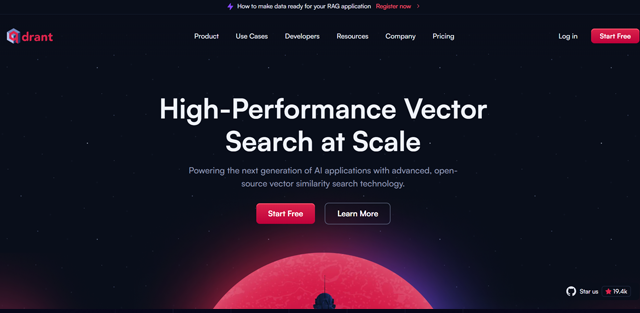
Qdrant is both a vector database and a vector similarity search engine. It functions as an API service, enabling you to find the closest high-dimensional vectors. Using Qdrant, you can effortlessly transform embeddings or neural network encoders into robust tools for tasks like matching, searching, recommending, and more.
What is Qdrant?
The Qdrant is a vector database and similarity search engine made for advanced AI apps. It ͏offers excellent performances, scalability, user-friendliness, and cost-effective choices that developers appreciate.
Unlock Next-Gen AI Apps: Powerful Vector Search with Qdrant (Hybrid Cloud)

What are the key features of Qdrant?
- Vector database.
- Vector similarity search.
- High performance and scalability.
- API service.
- Flexible deployment.
- Hybrid cloud.
- Community support.
- Security and compliance.
Deploy a Production-Ready Vector Database in 5 Minutes With Qdrant Hybrid Cloud (Source : Youtube Channel : Qdrant)
What are the use cases of Qdrant?
- HR and job search.
- E-commerce search.
- Food discovery.
- Biometric identification.
- Advertising.
- Fashion search.
- Customer support and sales optimization.
- Low-case search.
- Fintech.
- Medical diagnostics.
- Media and games.
How much does Qdrant cost?
Managed Cloud
Cost: $0
Features:
- 1GB free cluster forever, no credit card required.
- Fully managed with central cluster management.
- Supports multiple cloud providers and regions (AWS, GCP, Azure).
- Horizontal and vertical scaling.
- Central monitoring, log management, and alerting.
- High availability, auto-healing.
- Backup and disaster recovery.
- Zero-downtime upgrades.
- Unlimited users.
- Standard support plan (upgradeable to premium support).
Hybrid Cloud
Cost: $0.014 per hour (starting price).
Features:
- All benefits of Qdrant Cloud.
- Security, data isolation, optimal latency.
- Uses Managed Cloud Central Cluster Management.
- Standard support plan (upgradeable to premium support).
Private Cloud
Cost: Custom pricing (price on request).
Features:
- All benefits of Hybrid Cloud.
- Security, data isolation, optimal latency.
- Can use Managed Cloud Central Cluster Management or run the Central Cluster Management Interface on your own infrastructure, whether in the cloud, on-premise, at the edge, or even fully air-gapped.
- Premium support plan.
What are the pros and cons of Qdrant?
Pros of Qdrant
- Fast and accurate.
- Easy to use API.
- Distributed.
- Filterable.
- Rich data types.
- Efficient.
Cons of Qdrant
- Cost.
- Over-reliance.
 Qdrant pricing 2026: Plans, Features, and Subscription Costs Explained
Qdrant pricing 2026: Plans, Features, and Subscription Costs Explained
- Qdrant pricing plans starts at $0.014 per hour.
 Qdrant Reviews & Ratings: See What Users and Experts Are Saying
Qdrant Reviews & Ratings: See What Users and Experts Are Saying
 Qdrant FAQ: Learn How to Use It, Troubleshoot Issues, and More
Qdrant FAQ: Learn How to Use It, Troubleshoot Issues, and More
It helps find similar high-dimensional data points, like finding similar images.
Vectors are numbers used to represent data points.
A database specifically designed to store and search vectors.
A tool to find data points similar to a given query vector.
An Application Programming Interface, a way for programs to talk to Qdrant.
Yes, Qdrant offers a user-friendly API for developers.
Yes, Qdrant is known for its high performance and fast searches.
Yes, Qdrant can handle large datasets and growing workloads.
Yes, Qdrant offers a free tier with limited storage.
E-commerce search, image similarity search, and recommendation systems.
Yes, Qdrant can be used for semantic text search, understanding the meaning of text.
There can be costs associated with using Qdrant beyond the free tier.
Speed, accuracy, ease of use, and rich data type support.
Yes, Qdrant allows filtering based on additional data.
You can visit the Qdrant website for documentation and tutorials.
Yes, Qdrant offers community support for users.
Qdrant offers features for secure data storage and access control.
Yes, Qdrant offers a private cloud option for on-premise deployments.
 Summary
Summary
Qdrant is an avant-garde vector database and similarity search engine that empowers developers and businesses to build high-performance AI applications. With its robust features, scalable architecture, and cost-effective pricing, Qdrant is an ideal solution for AI-driven use cases, such as advanced search, recommendation systems, retrieval augmented generation, and data analysis.







